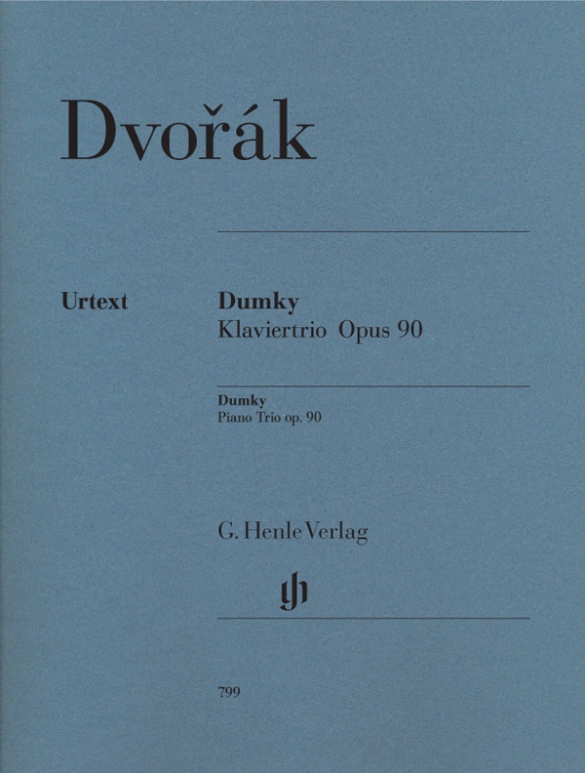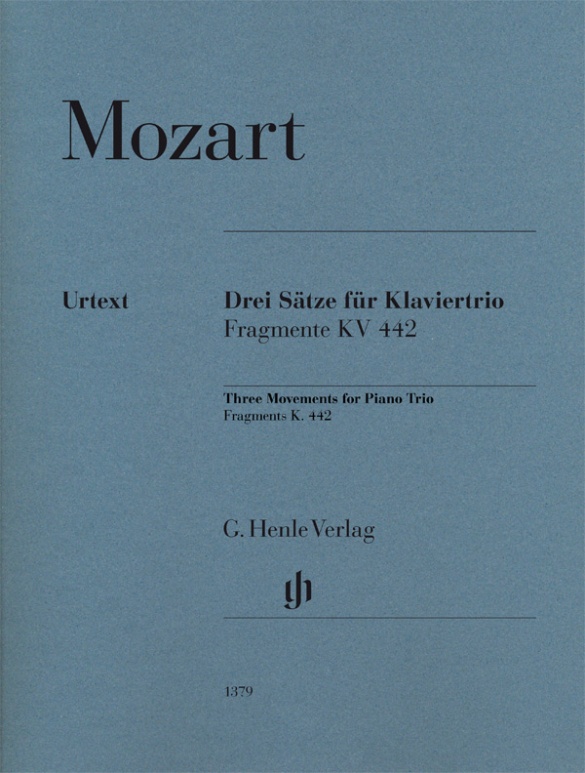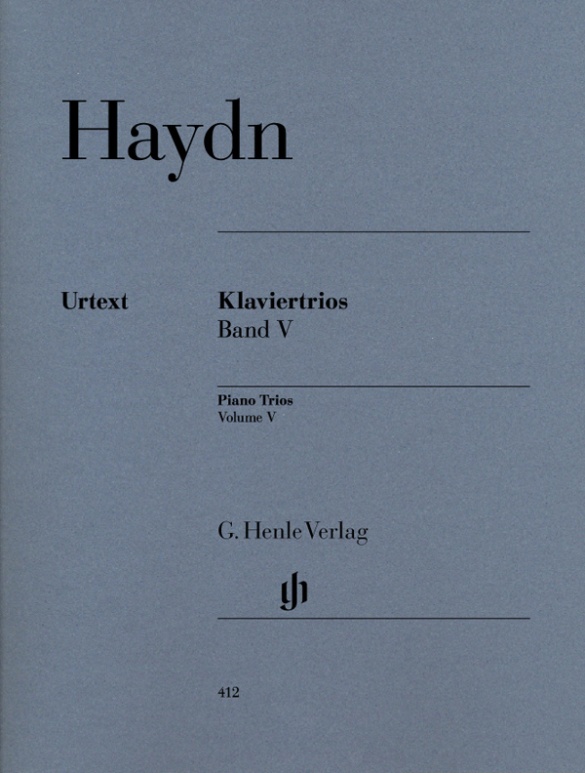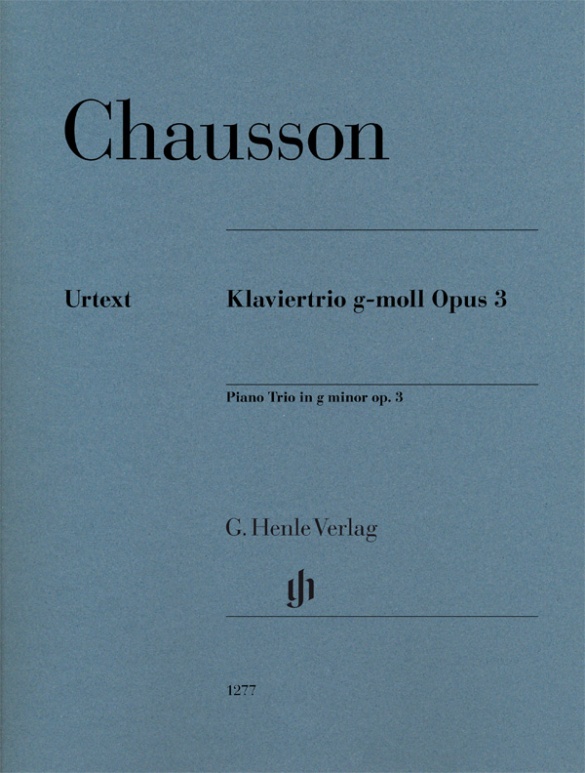

Ernest Chausson
Piano Trio g minor op. 3
Following his early elimination from the “Prix de Rome”, the sought-after award for composition students at the Paris Conservatoire, Chausson withdrew to the country in summer 1881 and began composing this ambitious work – out of defiance, so to speak. During his lifetime the trio remained an insider’s tip amongst those close to his teacher César Franck. It was only after its posthumous publication that it was performed more frequently and was gradually recognized as being one of the best chamber music works of his time. Closely based on Franck’s principle of the cyclic interleaving of all motives, it still has dark and melancholy inflections all of its own. The Henle Urtext edition is the first critical edition and a welcome addition to our collection of French music.
Content/Details
Exclusively in the Henle Library APP
Fingerings by: Boulanger Trio
About the Composer
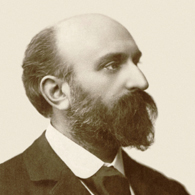
Ernest Chausson
French composer whose compositions are located stylistically at the threshold of Impressionism. He wrote numerous songs, stage works, chamber music, vocal and orchestral works.
| 1855 | Born in Paris on January 20. He receives a comprehensive artistic education (in music, literature, art) from Léon Brethous-Lafargue. |
| around 1865 | He takes piano lessons with Cornélius Coster. |
| from 1874 | In the salon of Madame Berthe de Rayssac, he plays music and is introduced to artistic circles. |
| 1877 | After completing his law studies, he receives an appointment to the Court of Appeal in Paris on May 7. |
| 1878 | He takes private lessons from Jules Massenet. |
| 1880 | At the Conservatoire he enters the composition studio of Jules Massenet, and audits courses with César Franck. |
| 1882 | In Bayreuth he attends a performance of Richard Wagner’s Parsifal that makes a lasting impression on him. There he meets Vincent d’Indy, Ernest Guiraud, and Camille Saint-Saëns, among others. |
| from 1886 | He is secretary of the Société Nationale de Musique in Paris. |
| from 1890 | Socializing in his Paris salon is an elite circle of composers, musicians, painters, and literary figures, among them Stéphane Mallarmé, Colette, Pierre-Auguste Renoir, Édouard Manet, César Franck, Claude Debussy, Paul Dukas, Charles-Marie Widor, Maurice Ravel, Eugène Ysaÿe, Henri Duparc, and Raoul Pugno. |
| 1899 | He dies in Limay on June 10 in a bicycle accident. |
About the Authors

Peter Jost (Editor)
Dr. Peter Jost, born in 1960 in Diefflen/Saar, read musicology, German and comparative studies at Saarland University in Saarbrücken. He did his PhD in 1988 with a thesis on Robert Schumann’s Waldszenen.
From November 1991 to April 2009 he was a research associate at the Richard Wagner Complete Edition in Munich, and since May 2009 has been an editor at G. Henle Publishers. His Urtext editions comprise predominantly French music of the 19th and 20th centuries, including works by Lalo, Saint-Saëns and Ravel.

Klaus Schilde (Fingering)
Prof. Klaus Schilde, born in 1926, spent his childhood in Dresden. There he was greatly influenced by Walter Engel, who taught him the piano (Kodaly method), composition and violin. From 1946–1948 he studied at the music conservatory in Leipzig with Hugo Steurer. After moving to the west in 1952 he studied with Walter Gieseking and Edwin Fischer, as well as with Marguerite Long, Lucette Descaves and Nadia Boulanger in Paris.
Schilde won numerous prizes. From 1947 onwards he gave concerts as a soloist and chamber musician on almost every single continent with renowned orchestras. He taught at the music conservatories in East Berlin Detmold, West Berlin, Munich, Tokyo (Geidai) and Weimar. From 1988–1991 he was President of the Staatliche Hochschule für Musik und Theater in Munich, where he also taught for decades as a professor. There are numerous radio and television broadcasts with Klaus Schilde as well as CD recordings. Schilde has contributed fingerings to almost 100 Henle Urtext editions.
Prof. Klaus Schilde passed away on 10 December, 2020.
Product Safety Informations (GPSR)

G. Henle Verlag
Here you can find the information about the manufacturer of the product.G. Henle Verlag e.K.
Forstenrieder Allee 122
81476 München
Germany
info@henle.de
www.henle.com
La presente edizione è in Urtext della G. Henle Verlag, sotto la revisione di Peter Jost, e la veste, come sempre, è bellissima.
Archi, 2017Trios will welcome this fastidiously researched score.
Strings Magazine, 2017Das Notenmaterial von Henle ist wie immer gut lesbar, praktikabel bei den Wendestellen und enthält in jeder Stimme sogar einen Dictionnaire (französisch/deutsch und französisch/englisch) der originalen französischen Vortrags- und Tempobezeichnungen. Ausgesprochen nützlich ist auch die Angabe der Taktgliederung im »Vite« überschriebenen zweiten Satz im schnellen 3/8-Takt: Dort wird der erste Takt einer Zähleinheit immer mit einer Eins angegeben. Dies erleichtert das Einstudieren enorm!
SMZ, 2017Erstmals veröffentlicht wurde das Trio posthum 1919 in Paris, und seither wird es auch gelegentlich gespielt, wenn es auch im Schatten des Concerts für Klavier, Violine und Streichquartett op. 21 steht. Dies zu ändern, ist nun neuerdings Gelegenheit mit einer neuen, allen Anforderungen an eine zuverlässige Ausgabe erfüllenden Henle-Edition, die auf der Erstausgabe fußt. Sehr angenehm ist auch die dt/engl Synopse der vielen französischen Vortragsbezeichnungen.
ESTA-Nachrichtenrecommendations
autogenerated_cross_selling
Further editions of this title
Further editions of this title


